
June 23
1883 Birth: Ludwig Mueller: Head of the German Faith Movement and Reich Bishop:

Pastor Ludwig Mueller joined the NSDAP in 1931 and was co-founder and regional leader of the "Movement of German Christian Believers" [Glaubensbewegung Deutsche Christen]. After Hitler assumed the chancellorship, Mueller acted as his "Plenipotentiary for Protestant Church Matters" and was appointed Reich Bishop on September 27, 1933. As the Third Reich's highest-ranking Protestant dignitary, he pursued the institutional and doctrinal "coordination" [Gleichschaltung] of the church from within. The synthesis of Christianity and racial theory that Mueller promoted, however, was rejected by segments of the Protestant Church, especially the Confessing Church [Bekennende Kirche]. Mueller managed to achieve neither ecclesiastical unity nor complete state control over the Gospel. Starting in July 1935, the Nazi regime pursued these goals by means of the newly-founded Ministry of Church Affairs under the direction of Hanns Kerrl, who began a campaign of persecution and oppression against oppositional theologians and clergy. At that point, Mueller lost almost all influence on Nazi ecclesiastical policy; he committed suicide shortly after the war ended.
1894 Birth: Edward VIII in Richmond, Surrey—the only British monarch to have voluntarily relinquished the throne; the monarch with the second-shortest reign in British history after Edward V; and the two are the only British monarchs never to have been crowned
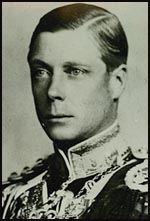
Edward was the great-grandson of Queen Victoria and his father was George V, who became king of the United Kingdom in 1910. As the king's eldest son, Edward therefore became heir to the throne.
When Edward was thirteen he became a naval cadet before being sent to France to learn the language. He returned to England in 1912 and studied at Magdalen College, Oxford. Edward was a poor student and after two years of study it was decided he should be given a commission in the British Army.
Upon the outbreak of the First World War in 1914, Edward asked Lord Kitchener, Secretary of War, if he could serve in France. When Kitchener refused, Edward commented that it did not matter if he was killed as he had four brothers. Kitchener replied that he was more concerned about the future king being captured by the German Army and then being used as a pawn in future peace negotiations. On the insistence of George V and Lord Kitchener, Edward was restricted to serving in staff appointments. This also proved dangerous as on one occasion, a German shell hit his car and killed the driver, just after the prince had left it to inspect the troops.
The war created problems for the royal family because of its German background. Owing to strong anti-German feeling in Britain, it was decided to change the name of the family from Saxe-Coburg-Gotha to Windsor. To stress his support for the British, George V and his sons made several visits to the Western Front.
After the war Edward continued to enjoy dangerous hobbies. He rode in steeplechases until he suffered a bad fall and his father forbade him to continue race-riding. George V also strongly disapproved of his son's decision to learn to fly. George V kept his son busy by sending him on a series of royal tours. This included visits to Canada, the United States, the Caribbean, India, Australia and New Zealand. Edward drew large crowds and his obvious popularity made him increasingly vain. As one observer noted, he had "difficulty in understanding the symbolic nature of his position and tended to assume that the attention focused on him was a direct consequence of his own particular gifts."
His father excluded Edward from discussions on political issues and instead urged him to find a wife and start a family. Edward refused and instead preferred to have relationships with women that the king considered to be unsuitable. In 1931 George began seeing a great deal of Wallis Simpson, an American woman who was married to Ernest Simpson. This was her second marriage and had divorced her first husband, E. W. Spencer in 1927. Edward's relationship with Simpson created a great deal of scandal. So also did his political views. In 1934 he made comments suggesting he supported the British Union of Fascists. Wallis Simpson's reputation was also hurt by rumours that she was also having an affair with Joachim von Ribbentrop, the German Ambassador to Britain. She was also known to hold pro-Nazi political views.
George V died on 20th January, 1936. Edward now became king, and his relationship with Wallis Simpson was now being reported in the foreign press. The government instructed the British press not to refer to the relationship. The prime minister, Stanley Baldwin, urged the king to consider the constitutional problems of marrying a divorced woman. Although the king received the political support from Winston Churchill and Lord Beaverbrook, he was aware that his decision to marry Wallis Simpson would be unpopular with the British public. The Archbishop of Canterbury also made it clear he was strongly opposed to the king's relationship.
The government was also aware that Wallis Simpson was in fact involved in other sexual relationships. This included a married car mechanic and salesman called Guy Trundle and Edward Fitzgerald, Duke of Leinster. More importantly, the Federal Bureau of Investigation believed that Wallis Simpson was having a relationship with Joachim von Ribbentrop, the German Ambassador to Britain, and that she was passing secret information obtained from the king to the Nazi government.
On 10th December, 1936, the king signed a document that stated he had renounced "the throne for myself and my descendants." The following day he made a radio broadcast where he told the nation that he had abdicated because he found he could not "discharge the duties of king as I would wish to do without the help and support of the woman I love." Edward moved to Austria and stayed with friends until Wallis Simpson obtained her divorce from her former husband. On 3rd June, 1937, the couple were married at the Château de Cande in France. The new king, his younger brother, George VI, granted him the title, the Duke of Windsor. However, under pressure from the British government, the king refused to extend to the new duchess of Windsor the rank of "royal highness".
Over the next two years Edward travelled extensively in Europe including visiting Nazi Germany where he met Adolf Hitler. When France was occupied by the German Army in 1940, Edward and his wife moved to Spain. In July 1940 the couple went to live in Portugal. Soon afterwards the Federal Bureau of Investigation received information that the Duke and Duchess of Windsor were being used by the Nazis to obtain secrets about the Allies. On 13th September 1940, an FBI officer sent a memo to J. Edgar Hoover that: "An agent has established conclusively that the Duchess of Windsor has recently been in touch with Joachim von Ribbentrop and was maintaining constant contact and communication with him. Because of their high official position, the duchess was obtaining a variety of information concerning the British and French official activities that she was passing on to the Germans."
The British government also discovered that Adolf Hitler planned to make Edward the puppet king of the United Kingdom if the Germans won the Second World War. When he heard the news, Winston Churchill, the British prime minister, arranged for the Duke of Windsor to leave Europe and become the governor of the Bahamas.
After the war the Duke and Duchess of Windsor lived in France. Edward's book, A King's Story, appeared in 1951. His wife's book, The Heart has its Reasons, appeared in 1956. Edward, Duke of Windsor, died in Paris on 28th May, 1972.
1902 "Mercedes" registered as a brand name: On this day in 1902, German automaker Daimler-Motoren-Gesellschaft (DMG) first registers "Mercedes" as a brand name; the name will gain full legal protection the next September. [For further details, Click here.]
1911 Volkishness: Guido von List takes members of the HAO on a "pilgrimage" to the St. Stephen's catacombs in Vienna, where List claimed to have first sensed Wotan while still a child. They then continue on to other Wotanist "sanctuaries" on the Kahlenberg, the Leopoldsberg and at Klosterneuburg. (THP)

1915 World War I: Various:
List Regiment: Gefreiter Adolf Hitler's 16 Reserve Infantry Regiment continue to occupy a position at Fromelles—pictured above in a drawing by Hitler—on a level field with water channels, willow trees and willow stalks. In the distance towards the enemy lines, lies an insignificant wood with barbed wire entanglements. Under the direction of their defense-minded commander, Lieutenant General Gustav Scanzoni von Lichtenfels, the regiment works ceaselessly day and night to further fortify their position at Fromelles while fighting off repeated assaults by the enemy. [For further details, Click here.]
[Exactly] one month after Italy declared war on Austria-Hungary, the Italian army attacks Austro-Hungarian positions near the Isonzo River, in the eastern section of the Italian front; it will become the first of twelve Battles of the Isonzo fought during World War I.
Of all the fronts of the Great War, the Italian was the least well-suited not only for offensive operations but for any form of warfare at all. Four-fifths of Italy s 600-kilometer-long border with Austria-Hungary was mountainous, with several peaks rising above 3,000 meters. Despite this, the Italian chief of staff, Luigi Cadorna, desperately wanted to satisfy the demands of his government, as well as the other Allies, by making substantial gains of territory against Austria-Hungary upon Italy's declaration of war on May 23, 1915.
For its part, Austria-Hungary was surprisingly unconcerned with the Italian entry into the war, despite the fact that it opened a third front for an army whose resources were already stretched dangerously thin. In the years before the war, the Austrian commander in chief, Conrad von Hotzendorff, had often suggested a pre-emptive strike against Italy, as well as against Serbia; in 1915, the prospect of confronting an inferior Italian army seemed to lend a new burst of energy to the Dual Monarchy. Germany, though, pressured Austria-Hungary to fight defensively in Italy and not to divert resources from the Eastern Front against Russia. As a result, while the Italians plotted ambitious offensive operations, including surprise attacks across the Isonzo River, the Austrians settled into their positions in the mountains along the rapid-flowing Isonzo and planned to mount a solid and spirited defense.
After a series of preliminary operations on various sections of the front, Italian forces struck the Austrian positions at the Isonzo for the first time on June 23, 1915, after a one-week bombardment. Despite enjoying numerical superiority, the Italian forces were unable to break the Austro-Hungarian forces, Cadorna having failed to assemble adequate artillery protection to back up his infantry troops: a mistake similar to those made early in the war by commanders on the Western Front. Two Austro-Hungarian infantry divisions soon arrived to aid their comrades at the Isonzo and the Italians were prevented from crossing the river; Cadorna called off the attacks on July 7.
In the four battles fought on the Isonzo in 1915 alone, Italy made no substantial progress and suffered 235,000 casualties, including 54,000 killed. Cadorna s plans for a highly mobile Italian advance had definitively failed, and battle on the Italian front, as in the west, had settled into slow, excruciating trench warfare.
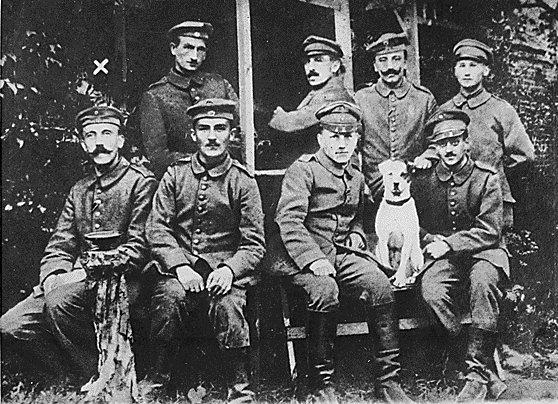
1916 World War I: List Regiment: Gefreiter Adolf Hitler endures trench warfare in Flanders (Artois) with 3 Company, 16 Reserve Infantry Regiment [List Regiment]. [For further details, Click here.]
Switzerland: Police shut down Zurich's Cafe Voltaire, regarding its artist patrons as dangerous. Note: This Cafe is one frequented by neighboring resident Mr. Uljanov, better known as Lenin, the Russian revolutionary.
1917 World War I: Various:
List Regiment: Gefreiter Adolf Hitler's 16th RIR remain east of Douai for a period of rest which will extend until June 24. [For further details, Click here.]
Note to the US Government from the Russian Democratic Government (via the Russian Ambassador to the US, Boris Bakhmeteff:
On behalf of the Russian Provisional Government and in behalf of all the people of new Russia, I have been first of all sent here to express their gratitude to the Government of the United States for the prompt recognition of the new political order in Russia. This noble action of the world's greatest democracy has afforded us strong moral support and has created among our people a general feeling of profound appreciation. Close and active relationship between the two nations based upon complete and sincere understanding encountered inevitable obstacles during the old regime because of its very nature. The situation is now radically changed with free Russia starting a new era in her national life. The Provisional Government is actively mobilizing all its resources and is making great efforts to organize the country and the army for the purpose of conducting the war
1919 Various:Baltics: Defeat of German forces at Cesis in northern Latvia during Estonian Liberation War, now celebrated annually as Estonian Victory Day.
Volkishness: Sebottendorff, now living in Constance, Switzerland, summons his sister, Dora Kunze, and his mistress, Kathe Bierbaumer. Soon afterward he converts the Muenchener Beobachter into a limited liability company, the Franz Eher Verlag Nachf. Bierbaumer is given 110,000 of the 120,000 marks of capital stock issued and Kunze the remaining 10,000. (THP)
1922 Austria: Adolf Hitler is once again one of the main speakers at a meeting of Walter Riehl's Austrian Nazi party (DNSAP) in Vienna. (THP)
[See: Austria: The Other Germany.]1928 Kellogg-Briand Pact: Further Correspondence with Government of the United States respecting the United States Proposal for the Renunciation of War:
There is nothing in the American draft of an antiwar treaty which restricts or impairs in any way the right of self-defense. That right is inherent in every sovereign State and is implicit in every treaty. Every nation is free at all times and regardless of treaty provisions, to defend its territories from attack or invasion, and it alone is competent to decide whether circumstances require recourse to war in self-defence. If it has a good case, the world will applaud and not condemn its action. Express recognition by treaty of this inalienable right, however, gives rise to the same difficulty encountered in any effort to define aggression.
1934 Albania: Italian warships occupy the Albanian port of Durazzo.
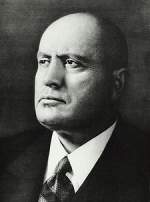
1935 Mussolini rejects British concessions concerning Abyssinia.
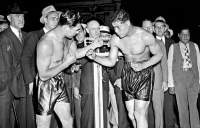
1938 Heavyweight boxing champion 'Brown Bomber' Joe Louis knocks out Germany's Max Schmeling in 2 minutes 4 seconds of the first round of their rematch at Yankee Stadium.

1939 Church and Reich: From a confidential letter (Document 123-PS) from Martin Bormann to the Minister of Education, in which Bormann sets forth the Party's decision to order the suppression of numerous theological faculties and religious institutions, including the dissolution or restriction of 19 separate religious institutions:
In the above I have informed you of the Party's wishes, after thorough investigation of the matter with all Party offices. I should be grateful if you would initiate the necessary measures as quickly as possible. With regard to the great political significance which every single case of such a consolidation will have for the Gaue concerned, I ask you to take these measures and particularly to fix dates for them always in agreement with me.

1940 World War II: Hitler makes a brief tour of occupied Paris:
In his first and only visit to Paris, Hitler made Napoleon's tomb among the sites to see. "That was the greatest and finest moment of my life," he said upon leaving. Comparisons between the Fuehrer and Napoleon have been made many times: They were both foreigners to the countries they ruled (Napoleon was Italian, Hitler was Austrian); both planned invasions of Russia while preparing invasions of England; both captured the Russian city of Vilna on June 24; both had photographic memories; both were under 5 feet 9 inches tall, among other coincidences.
As a tribute to the French emperor, Hitler ordered that the remains of Napoleon's son be moved from Vienna to lie beside his father. But Hitler being Hitler, he came to do more than gawk at the tourist attractions. He ordered the destruction of two World War I monuments: one to General Charles Mangin, a French war hero, and one to Edith Cavell, a British nurse who was executed by a German firing squad for helping Allied soldiers escape German-occupied Brussels. The last thing Hitler wanted were such visible reminders of past German defeat.
Hitler would gush about Paris for months afterward. He was so impressed, he ordered architect and friend Albert Speer to revive plans for a massive construction program of new public buildings in Berlin, an attempt to destroy Paris, not with bombs, but with superior architecture. "Wasn't Paris beautiful?" Hitler asked Speer. "But Berlin must be far more beautiful. [W]hen we are finished in Berlin, Paris will only be a shadow."
From Adolf Hitler by John Toland:It was pitch-dark when the party‑-which included Keitel and Bormann and several adjutants‑-arrived at a meadow outside Bruly-de-Pesche and climbed into a plane piloted by Baur, but by the time they reached Le Bourget the sun was up. June 23 was going to be a bright, hot day. Hitler climbed into the first open car of a motor column, seating himself as usual beside the driver. Behind him sat the rest of the party. As they headed for the first stop, the Opera, the streets of the city were deserted except for an occasional gendarme who would dutifully greet the Fuehrer with a smart salute. Breker had spent his most decisive years in Paris and was shocked to see the almost complete absence of life.
Hitler's features slowly relaxed as he took in the architectural wonders of the Opera, which he had admired since his early days in Vienna. He was a familiar with the building as with his own chancellery and his eyes shone with excitement. "This is the most beautiful theater in the world!" he called out to his entourage. He inspected the boxes and noted that one room was missing. The white-haired attendant who had been accompanying them with stiff pride announced coolly that it had been eliminated years ago. "There, you see how well I know my way about!" said Hitler with the pride of a schoolboy.
After a stop at the Eiffel Tower they visited Napoleon's tomb. Here Hitler placed a cap over his heart, bowed and gazed for some time down into the deep round crypt. He was very moved. Finally he turned to Giesler [Munich architect Hermann Giesler, Hitler's General Building Inspector for the reorganization of the city of Munich, later he became also a director in the Organization Todt and even later he was tasked with the reorganization of the entire city of Linz] and said quietly, "You will build my tomb." (FN: Later he gave Giesler explicit instructions. His tomb was to be extremely simple and it would be placed in Munich. "Here I was truly born," he said, "Here I started my movement and here is my heart.") He lapsed into pensive silence, then instructed Bormann to transfer the bones of young Napoleon from Vienna to his father's side.
The three-hour tour ended on the heights of Montmartre, the Mecca of art students. Perhaps it reminded Hitler of his own student days. Lost in thought for some moments, he finally turned to Geisler, Breker and Speer. "Now your work begins," he said. The rebuilding of cities and monuments was entrusted to them. "Bormann," he said, "help me with this. Take care of my artists." Hitler again surveyed the city which stretched below. "I thank fate to have seen this city whose magic atmosphere has always fascinated me," he said. That was why he had ordered his troops to by-pass Paris and to avoid combat in its vicinity. "So that picture before us would be preserved for the future." But the few Parisians who saw him that morning were reduced to panic. As his cavalcade came upon a group of boisterous market women the fattest pointed in terror at Hitler. Her shriek of "It's him! It's him!" spread pandemonium.
1940 World War II: Various:
Vichy France:
Pierre Laval is appointed Deputy Premier by Petain. General de Gaulle is cashiered by General Weygand.German Ambassador in the USSR (Schulenburg) to German Foreign Office:
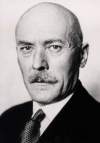
Molotov made the following statement to me today: The solution of the Bessarabian question brooked no further delay. The Soviet Government was still striving for a peaceful solution, but it was determined to use force, should the Rumanian Government decline a peaceful agreement. The Soviet claim likewise extended to Bucovina, which had a Ukrainian population. As justification Molotov declared that, although a long time had elapsed since his declaration before the Supreme Soviet, Rumania had done nothing to bring about a solution of the Bessarabian problem. Therefore, something would have to be done. I stated to Molotov that this decision of the Soviet Government had not been expected by me. I had been of the opinion that the Soviet Government would maintain its claims to Bessarabia-not contested by us-but would not itself take the initiative toward their realization. I feared that difficulties in the foreign relations of Rumania, which was at present supplying us with very large amounts of essential military and civilian raw materials, would lead to a serious encroachment on German interests. I told Molotov that I would report to my government at once, and I requested him not to take any decisive steps before my Government had taken a stand concerning the intentions of the Soviet Government. Molotov promised to inform the Soviet Government of my request but emphasized expressly that the matter was extremely urgent. Molotov added that the Soviet Government expected Germany not to hinder but to support the Soviets in their action. The Soviet Government on its part would do everything to safeguard German interests in Rumania. Accordingly, I request immediate instruction by wire. I take the liberty of calling attention to the numerous Volksdeutsche residing in Bessarabia and Bucovina for whom provision of some sort will have to be made.
Gulag: Third of four mass deportations of Poles to Siberia by the Soviets. Taken are 240,000 of those who fled the Nazis, small merchants, doctors, teachers and journalists.
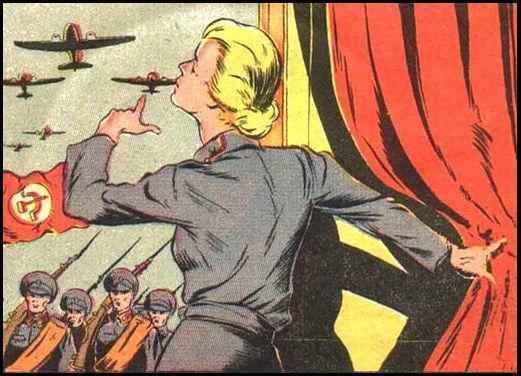
1941 Various:
Barbarossa: The Luftwaffe (German Air Force) destroys over 2,000 Red Air Force aircraft. Many are caught on the ground in the first hours of the assault. The numerically strongest air force in the world is wiped out in 48 hours. The Commander of Russian Aviation, General Rychagov, is given the death sentence for "treasonable activity" (i.e., defeat.)
German forces of Heeresgruppe Sued cross the river Bug in southern Poland and capture Brest-Litovsk.
Slovakia declares war on the Soviet Union. (Clark II)
Lithuanian Activist Front initiates Lithuanian 1941 independence from the Soviet Union; it lasted only briefly as the Nazis occupied Lithuania a few weeks later. Estimates for the number of the Lithuanian rebels vary from 30,000 to 100,000; the latter figure possibly includes some inactive LAF members.
Euthanasia: Poland: The first group of Polish mental patients are deported to Auschwitz.
1942 World War II: Various:
North Africa: The Afrikakorps reaches the Egyptian border near El Alamein.
[See: The Mediterranean Strategy.]1942 Holocaust: By this time, almost all 15,000 Serbian Jews deported to the concentration camp at Zemun have been gassed in mobile gas units, disguised as Red Cross vans (see November 1941 and August 29, 1942). (THP)
1944 World War II: Various:
Death: Generaloberst Dietl—C-in-C of 20th Gebirgsarmee on the Arctic front in northern Finland, is killed in an air crash.
Churchill to FDR:

The Russians are the only power that can do anything in Rumania, and I thought it was agreed between you and me that . . . they should try to give coherent direction to what happened there. In point of fact we have all three cooperated closely in handling in Cairo the recent Rumanian peace-feelers. On the other hand, the Greek burden rests almost entirely upon us . . . .
I cannot admit that I have done anything wrong in this matter. It would not be possible for three people in different parts of the world to work together effectively if no one of them may make a suggestion to either of the others without simultaneously keeping the third informed. A recent example of this is the message you have sent quite properly to Uncle Joe about your conversations with the Poles, of which as yet I have heard nothing from you. I am not complaining at all of this, because I know we are working for the general theme and purposes, and I hope you will feel that has been so in my conduct of the Greek affair . . . .
I am keeping you constantly informed, and I hope to have your confidence and help within the spheres of action in which initiative is assigned to us.
Miscellaneous: German author Thomas Mann becomes a US citizen.
1951 Death: General Henri Philippe Petain: in a French prison:
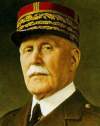
After the French government moved to Vichy in unoccupied France, Petain was voted full power to draft a new constitution on July 10. The next day he declared himself "head of government and " head of state, taking the eager collaborationist Pierre Laval as his vice premier. In October, Petain met with Hitler at Montoire to offer his collaboration. Later, in his defense, Petain made the claim that he was playing a cunning "double game, hoping to shield France from destruction until Germany's defeat. In fact, Petain persistently sought to trade his government's cooperation with Germany for a non-punitive peace, the maintenance of the French empire, and an important role for a regenerated France in the new order that he believed would be established after Germany's victory over Britain. France, he hoped, would serve as a "west wall and help defend Europe against Bolshevism. Petain also dreamed of an internal "national revolution to transform France into a stable authoritarian order based on "work, family, fatherland."
Hitler, however, spurned French offers and promised nothing because he knew that Petain was powerless to resist his increasingly harsh demands for money, materiel, workers, and, finally, Jews for slaughter. The German occupation of all of France after the Allied invasion of North Africa in November 1942 reduced Petain to the figurehead of a regime serving German interests. When Petain attempted to dismiss Laval in December 1943, Hitler ordered him to keep Laval and to remain in office. Petain nevertheless clung blindly to the belief that only a cooperative neutrality could protect French interests, property, and lives. When the Allies landed in Normandy in June 1944, he ordered the French to be "quiet and orderly, not to aid the armies that were liberating his country.
In August 1944 he was forcibly moved by the Germans to Belfort and then to Germany. He returned to France in 1945 and was tried in Paris. On Aug. 15, 1945, he was sentenced to death. De Gaulle, however, immediately commuted the sentence to life imprisonment.
1956 Nasser elected president:
On June 23, 1956, 99.95 percent of Egyptian voters mark their ballots to elect Gamal Abdel Nasser as the first president of the Republic of Egypt. Nasser, who toppled the Egyptian monarchy in 1952 in a military coup, was the only presidential candidate on the ballot. In the same ballot, Nasser's new constitution, under which Egypt became a one-party socialist state with Islam as the official religion, was approved by 99.8 percent of voters. [For further details, Click here.]
1959 Cold War: Klaus Fuchs released:
After only nine years in prison, Klaus Fuchs, the German-born Los Alamos scientist whose espionage helped the USSR build their first atomic and hydrogen bombs, is released from a British prison. Fuchs immediately left Britain for communist East Germany, where he resumed his scientific career.
As a student in prewar Germany, Fuchs joined the German Communist Party in 1930 but in 1934 was forced to flee after Nazi leader Adolf Hitler came to power. Settling in Britain, he became a brilliant young scientist and was recruited by the British military after the outbreak of World War II. Despite his communist past, he was granted security clearance. In 1943, Fuchs was sent with other British scientists to the United States to join the top secret U.S. atomic program. Eventually stationed at atomic development headquarters in Los Alamos, New Mexico, Fuchs became an important figure in the program.
Unbeknownst to anyone at Los Alamos, he made contact with a Soviet spy soon after his arrival and offered precise information about the program, including a blueprint of the "Fat Man" atomic bomb later dropped on Nagasaki, Japan, and everything that the Los Alamos scientists knew about the hypothesized hydrogen bomb. After the war, Fuchs returned to England, where he continued his atomic work and Soviet espionage until December 21, 1949, when a British intelligence officer informed the physicist that he was suspected of having given classified nuclear weapons information to the USSR. The discovery of Fuchs's espionage came four months after the Soviet Union successfully detonated its first atomic bomb.
Fuchs pleaded guilty and on March 1, 1950, after a two-hour trial, was convicted. By British law he could be sentenced to only 14 years in prison because the USSR was not an official British enemy at the time of his arrest. After nine years, he was released from prison for good behavior and immediately left Britain for communist East Germany. He died in 1988.
The revelation of Fuchs' espionage was a major factor leading to President Harry Truman's approval of massive funding for the development of the hydrogen bomb, a weapon theorized to be hundreds of times more powerful than the atomic bombs dropped on Japan. The first U.S. hydrogen bomb was successfully detonated in 1952. Three years later, the Soviet Union detonated its first hydrogen bomb on the same principle of radiation implosion.
2016 European Union: By a majority of about one million, the electorate of the United Kingdom vote in a referendum to leave the EU.
Edited by Levi Bookin (Copy editor)
levi.bookin@gmail.com



Click to join 3rdReichStudies



Disclaimer: This site includes diverse and controversial materials—such as excerpts from the writings of racists and anti-Semites—so that its readers can learn the nature and extent of hate and anti-Semitic discourse. It is our sincere belief that only the informed citizen can prevail over the ignorance of Racialist "thought." Far from approving these writings, this site condemns racism in all of its forms and manifestations.
Fair Use Notice: This site may contain copyrighted material the use of which has not always been specifically authorized by the copyright owner. We are making such material available in our efforts to advance understanding of historical, political, human rights, economic, democracy, scientific, environmental, and social justice issues, etc. We believe this constitutes a "fair use" of any such copyrighted material as provided for in section 107 of the US Copyright Law. In accordance with Title 17 U.S.C. Section 107, the material on this site is distributed without profit to those who have expressed a prior interest in receiving the included information for research and educational purposes. If you wish to use copyrighted material from this site for purposes of your own that go beyond 'fair use', you must obtain permission from the copyright owner.
Please Note: The list-owner and moderators of 3rdReichStudies are not responsible for, and do not necessarily approve of, the random ads placed on our pages by our web server. They are, unfortunately, the price one pays for a 'free' website.